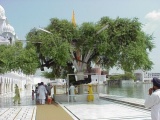Saini
|
Sikhism does not endorse caste based distinctions in society that lead to unequal opportunities for some people. In fact, Sikhism completely rejects class or race based distinctions between humans, that leads us to make an inequitable society. Such distinctions have surfaced only due to ill interests of certain section of people, who, on the pretext of making a society more manageable through these classifications, eventually paved the way to an unequal grouping within the human race. This article is just for information purpose and to share how people from different castes came into the Sikh fold. So, please treat this article as a source of general information about this issue and kindly do not amend this article to highlight this important underlying Sikh principle. If you have any comments, please discuss them appropriately here |
| Castes & Tribes | |
| Saini | |
| Classification | Kshatriya |
| Subdivisions | Shurasena |
| Significant populations in | India, UK, |
| Languages | Punjabi, Hindi |
| Religions | Sikhism, Hinduism |
Sikh Saini - (Forword Caste)
saini caste of North India who were traditionally landowners. Sainis claim to be descendants of a king, Shurasena, as well as of Krishna and Porus, and to be related to the ancient Shoorsaini clan, noted in Puranic literature. This is disputed and the 1901 census noted that people using the Shoorsaini name were by then found only in Punjab, Haryana, Jammu and Kashmir, Himachal Pradesh and Delhi. Sainis also claim themselves to be Rajputs of Yaduvanshi descent
Etymology and Historical of Sikh Sainis
Saini migration to Punjab happened around the time of the earliest Turk invasions when the post-Kanishka Yadava or Surasena kingdoms of Mathura and Bayana were lost to Muslim invaders.The Sainis of Jalandhar and Hoshiarpur districts to be the descendants of the Rajputs of the Yaduvanshi or Surasena lineage who ruled these kingdoms, who escaped to these areas to avoid forced conversion to Islam.
Agriculture had been the major profession of Sainis since the Turko-Islamic conquest of North India. However after militarization of Sikhs Sainis once again joined armed insurrection against Turko-Islamic rule as part of Khalsa armies. Even among Hindu Saini families it was customary to raise at least one son as a Sikh and dedicate him to military service in Sikh militant bands spread all over Punjab, engaged first in armed insurgency and later in a full scale war against the oppresive Turko-Pathan rule. Agriculture and military service were the main professions of Sainis since the Sikh rebellion and conquest of Punjab.The British Raj Land Settlement Report for Jalandhar division in 1892 reported the Sainis in increasing numbers in their original profession i.e army, especially in cavalry, in addition to being in agriculture.
History of Sikh Sainis
Sikh Sainis are more commonly referred to as Shurasenas because their reverence for the famous Misl leader, Jai Singh Kanhaiya (1749-1884), who was a Saini.
Baba Buddha (Holy Tree) Worship by Everyone Tan Tan Waheguru Sikh Saini Very Important in Harmandir Sahib
Saini Classified with other Castes
Saini is classified with other rajput tribe..the origin of saini is belong to shurseni of mathura..
Saini Matrimonial (Mariages)
Traditionally, Sainis have been married through Vedic ceremonies performed by Brahmins of Sanatani tradition. However, in the 20th century some Hindu families started opting for Arya Samaj based vedic ceremonies and Saini Sikhs started opting for Anand Karaj ritual.
According to the Anthropological Survey of India, "The Saini are endogamous community and observe exogamy at village and gotra level." Remarriage after the death of a spouse is permitted nowadays, as is divorce.
Saini Surname / Gotra
Badwal, Banwait, Bhele, Bola, Chand, Chandan, Chandel, Chhilne, Cherra, Daula, Dhanota, Dhaul, Dulku, Gelhan, Gidde, Gahir, Gahoon, Gahunia, Hadda, Hadh, Hamdard, Kanhaiya, Jagait, Japrre, Jandoria, Longia, Kaloti, Pabla, Rawal, Nanua, Saggi, Saini, Tamber, Tantray, Togar, Vaid,



